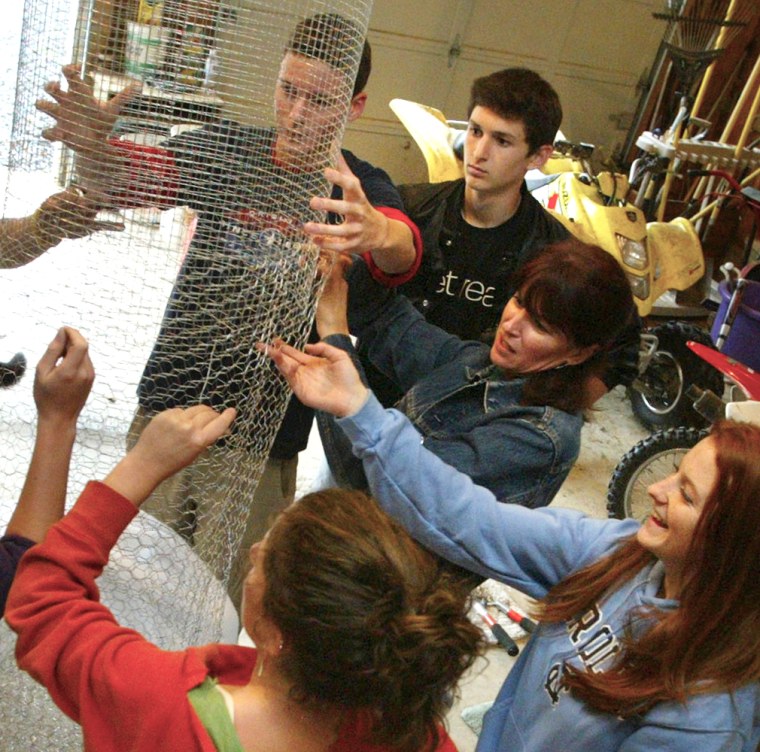It turns out the students at Loudoun Valley High School in Purcellville will, in fact, be allowed to tango at tomorrow's Homecoming Dance.
They can salsa and swing dance too, Principal Gerald Black has promised, although they have all signed a pledge that they will "face each other" on the dance floor. Also on the pledge's list: no drugs, alcohol or "freak dancing."
Loudoun Valley and Loudoun County's other seven high schools are just the latest to grapple with the bumping and grinding club moves that have seeped into school dances across the Washington region and the nation over the past couple of years.
But in Loudoun, the response has generated as much attention as the dancing. All high school students have been asked to sign an agreement promising to keep their dancing clean — or stay off the floor.
Loudoun Valley's "face each other" order had seemed reasonable, Black said, a simple attempt to stop popular back-to-front dancing in which a girl gyrates her hips against the pelvis of a guy standing behind her.
"It's very suggestive, and it would certainly not be appropriate in a school setting," he said.
But the pledge has sparked a student-led protest about freedom and self-expression. More than 300 students signed a petition complaining that the rule is "arbitrary, irregular and in violation of ... First Amendment freedoms of expression in all forms," said senior Anton Soukup, 17.
Another student printed a T-shirt with the message, "How are we supposed to do the hokeypokey if we can't turn ourselves around?"
‘This is our generation’s version of the twist’
High schools in Montgomery County, Arlington and elsewhere have confronted the quandary of how to rein in what is known as "freak dancing." But most have dealt with the phenomenon on an individual basis. Some schools ban the dancing — and watch attendance at the events drop. Others admonish students to keep it clean. So far, with the exception of Loudoun's, there appear to be no systemwide policies.
When Loudoun Valley teachers handed out the required contract last week, it was greeted by almost immediate protest, several students said. They said they'd grown up "grinding" and felt the dancing was simply misunderstood by adults.
"This is our generation's version of the twist," said Jessica Nauta, 17. "A lot of older people think it's a sexual act. It's really not."
She acknowledged that some dancing can go over the line but said that's why dances are chaperoned. Requiring students to sign a promise to dance face to face simply encourages students to test the limits, she said.
"We all understand we live by different rules at school, but freedom of expression shouldn't be something they should make us throw away," she said.
A 'stay classy' contract
At Yorktown High in Arlington, Principal Raymond Pasi allowed a homecoming dance earlier this month only after the student government had put out a "stay classy" contract that students were asked to sign.
Turnout was lower than usual, and some youngsters got sent home early for dancing inappropriately, but Pasi said the atmosphere was much improved over last year's dance when some chaperones were so offended that they refused to take part again.
On the subject of dancing, passions have run particularly high in Western Loudoun, a growing semi-rural area that boasts both the national headquarters of the Home School Legal Defense Association and the county's only elected Democratic supervisor.
"I've been giving a lot of thought to this, and I do believe its a different clientele out here," said Priscilla B. Godfrey (Blue Ridge), who represents the Loudoun Valley area on the School Board. Only in the west have there been complaints about the issue, and they have come from both sides, she said.
The district has both people who are "very on to First Amendment rights" and "a very strong Christian community," she said.
Some parents complain
County officials decided to require pledges after several parents and students complained at a School Board meeting in the spring that Loudoun Valley High's dances had become so explicit that they felt they could no longer attend.
"I had girls come and talk to me afterwards, and they felt really degraded about what they had done at the prom," said Christian Amonson, 17, one of those who spoke at the meeting.
But parent Laura George immediately saw a First Amendment threat in the pledge Loudoun Valley put out, and she encouraged her daughter and her classmates to protest.
"Civil rights are falling by the wayside every second," she said. "I've got to take a stand here for my kids. I've got to teach them that you question authority when authority's gone mad."
Nonsense, said Barbara Curtis, a parent of a Loudoun Valley student who complained about dancing in a column in a local newspaper last spring. She is writing a book about "dirty dancing at the prom" and said she's done dozens of interviews with students nationwide, including girls whose dates had ditched them when they refused to take part.
"It's not a very noble cause to be fighting for," she said. "The kids with the petition, they know what's been going on."
Black held a meeting Wednesday with students concerned that the contract had gone too far. Then the principal went on the school's public address system to assure students he will apply the "face each other" rule with common sense.
"We're not going to be the Gestapo, the military police to throw them out," he said. "It's certainly not the intention of anyone to stifle them having fun."
That mostly quieted fears and protest, said Erin Conroy, 17, one of those who had been upset. She said students are waiting to see what tomorrow's dance is like. "We don't want to have to fight about it," she said.
